London Marathon 2016: Dame Kelly Holmes' latest challenge
- Published
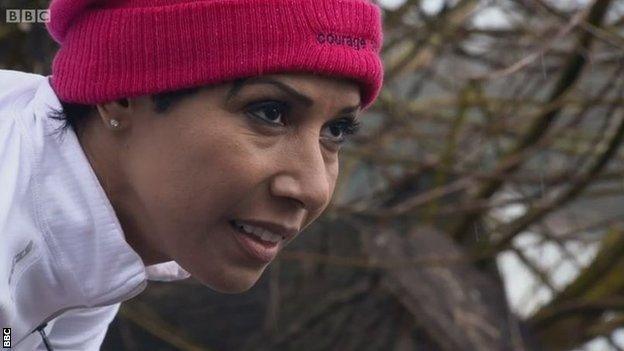
Dame Kelly Holmes is aiming to raise £250,000 for five charities by running this year's London Marathon
2016 London Marathon |
|---|
Date: Sunday, 24 April Start times: 08:55 BST wheelchair races, 09:15 elite women, 10:00 elite men and mass start |
Coverage: Live on BBC TV, Radio 5 live and the BBC Sport website with extra streams on Red Button, Connected TVs and Sport app. Full details. |
A Million Reasons to Run: Gabby Logan learns the incredible stories of runners from all walks of life - Saturday, 23 April, 12:30-13:00 BST, BBC Red Button & 13:00-13:30 BST, BBC One |
The alarm chirps, annoyingly energetic at such an unwelcome hour. It's 5am. Dame Kelly Holmes, eyes acclimatising to the darkness, mind adjusting to being abruptly stirred, bumbles out of bed to the kitchen.
In the blinding artificial light, she homes in on a monster-sized flapjack and devours it, washing it down with a glass of water before returning to bed.
Two hours later and the alarm is full of vim again. The double Olympic champion, ignoring the devil on her shoulder begging for rest, glances in the direction of her trainers.
It wasn't like this when the 46-year-old was training for Olympic gold. There were no brutal long-distance runs on country lanes at hours when only milkmen are truly alert.
It is the day she will run 18 miles for the first time in her life. She stretches, puts on a woolly hat - her must-have accessory on every run - and charges out on a morning cold enough to freeze breath.
Holmes on her London Marathon preparations and plans
The humdrum pounding of tarmac over a daunting distance plays with her mind. Manipulative voices become louder with every mile; one telling her to stop, to give in, the other demanding she ignores the pain. It is torture.
She is constantly checking the clock, counting down the miles. One hour becomes two, on and on she goes. Holmes, the first British woman to win two Olympic gold medals at the same Games, is not a marathon runner.
Even when she was in her athletic prime, her body would often cave in; stress fractures, ruptured Achilles, chronic fatigue. They would lead to self harm, to suicidal thoughts.
Holmes: A life less ordinary | |
|---|---|
1994 - Wins 1500m Commonwealth gold and European 1500m silver | 2000 - Secures 800m bronze at the Sydney Olympics |
2004 - Claims double Olympic gold and is crowned BBC Sports Personality of the Year | 2005 - Named Laureus World Sportswoman of the Year and announces her retirement from athletics |
More than a decade on and her mind is better equipped to deal with failure, but the body is still not coping with punishing training routines.
She hobbles home, wincing as she puts one foot in front of the other. Eighteen miles on the clock, but her hips ache, her nerves are inflamed. It feels like ants are crawling all over her body.
Holmes knows she will have to go to the hospital again for spinal injections to release the tension. The doctor will order her not to run for another seven days.
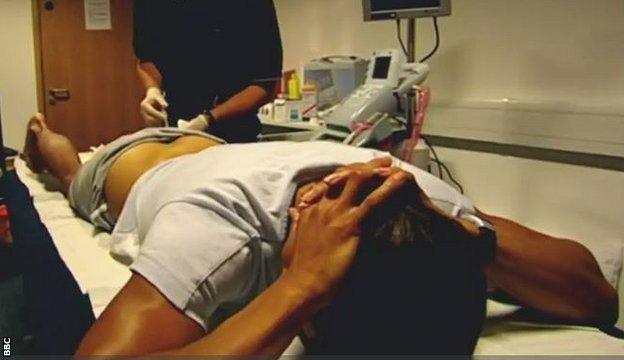
Holmes says she suffered with injuries more than most during her athletics career
"I wish I'd done this training under the radar, but I've opened my mouth now. I can't not do it," she says, three weeks after her crippling 18-mile run, a hint of seriousness hidden in the laughter.
"I didn't think about how training for the London Marathon would affect my body. I expected it to be hard, I expected it to hurt somewhere, but the body is in shock.
"I've always had problems with my lower back, but it's more intense now because of the way I'm running. I run on my toes, it's a lopey stride, and the way my hips are twisted allowed me to do what I did. Now I'm doing longer stuff it's changing me biomechanically - it's changing the way my body is reacting to running.
"Because I'm feeling pain everywhere, my stride is shortening and I'm having a lot of bad hip pains.
"I haven't the mentality I had when I was an elite athlete. There's been no training plan. Refuelling? I'm rubbish at that. When I did the 18-miler I woke myself up to eat and then went back to sleep just so I had a bit of fuel.
"When I come back from a run I know I should have an ice bath, but when the alternative is a hot bubble bath I think 'sod that'."
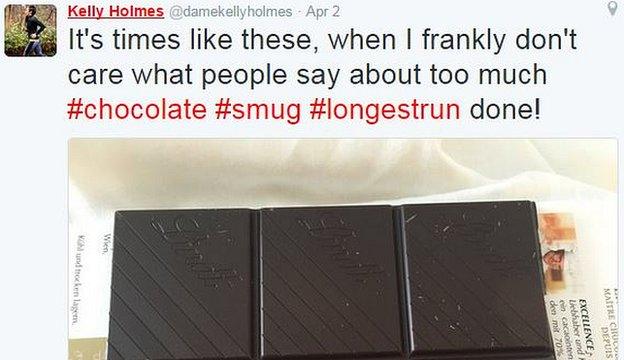
Holmes has regularly been updating her Twitter followers about her training
Some friends, Holmes admits, are "laughing their heads off" at her antipathy towards three months of miserable training. When it comes to marathon running, this two-time Commonwealth champion, the 2004 BBC Sports Personality of the Year, is almost like the rest of us.
"They're saying 'you're a mess, you're too old,'" says a chuckling Holmes. And then there's mum, Pam, non-competitive and unable to fathom why her daughter has chosen to drag her body around the streets of London for 26.2 miles.
"'Why are you putting yourself through that?'" says Holmes, wagging her finger, mimicking her mum. "I just tell her: 'Mother, a challenge is a challenge!'"
Despite the motherly concern, Holmes' mum is one of the reasons why the Dame will be among thousands of runners raising money for charity this Sunday because, last year, her mum was diagnosed with myeloma, a cancer of the blood. "She's now in remission, but it's an incurable cancer," Holmes explains.
She is trying to raise £250,000 for five charities - Mind, Dame Kelly Holmes Trust, Hospice in the Weald, MyelomaUK and The Pickering Cancer Centre - and there is a personal story to each.
Sports Personality: Dame Kelly Holmes world-beating 2004
It is no surprise to hear the former soldier describe herself as the sort of person who pushes herself to the limit. How else could two Olympic gold medals be won the year after grappling with depression?
In 2003, Holmes sank to the lowest of lows because of injury, locking herself in a bathroom and slashing her left arm with a pair of scissors. "One cut for every day I was injured." It was, she would admit, the worst period of her life.
She describes her life as a "journey and a half", one which went from rock bottom to historic peak when, in six glorious days, she twice crossed the finishing line at the Olympic Stadium in Athens ahead of her rivals; arms aloft, goggle-eyed incredulity at becoming the 800m and 1500m Olympic champion. The first Briton for 84 years to achieve the Olympic middle-distance double.
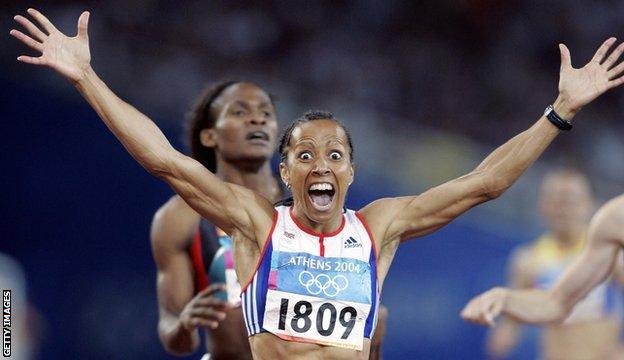
Dame Kelly Holmes celebrates winning a thrilling 800m gold in Athens, passing training partner Maria Mutola in the last 50 metres
"I've missed not having a personal, physical challenge because that's what makes me me," says Holmes, going on to add that raising money for charity is what has sustained her motivation these past few months.
"I have to have challenges, go through the trauma of doing it. That's what I fight for.
"I want to do one big charity push now and take some time out. I need something that's just for me. Everything's been for other people in the past few years. I need time and I don't give myself time."
Is Holmes concerned she might not complete Sunday's terrifying assignment? A stupid question. There is no doubt. After all, Holmes was twice told to retire by doctors before the Sydney Olympics in 2000.
"I will finish it," she says, eyes widening. "When I was an athlete I knew my sport inside out. I knew what I needed to do to be good. If I went to an event I'd pretty much know the outcome whereas with this I don't know what's going to happen, but I'll finish the race.
"I'm hoping I just run round but if I end up having to walk for whatever reason then I'm going to have to deal with that.
"When I'm going down The Mall, I'll be sprinting like Usain Bolt and I'll be so proud of myself."
Follow the London Marathon on the BBC
You can follow the full coverage of the 2016 London Marathon on the BBC and we will be featuring more inspirational stories from you in our live text commentary on Sunday.
Get involved: Send us your London Marathon stories and messages by using the hashtag #GetInspired, external on social media
- Published3 March 2018
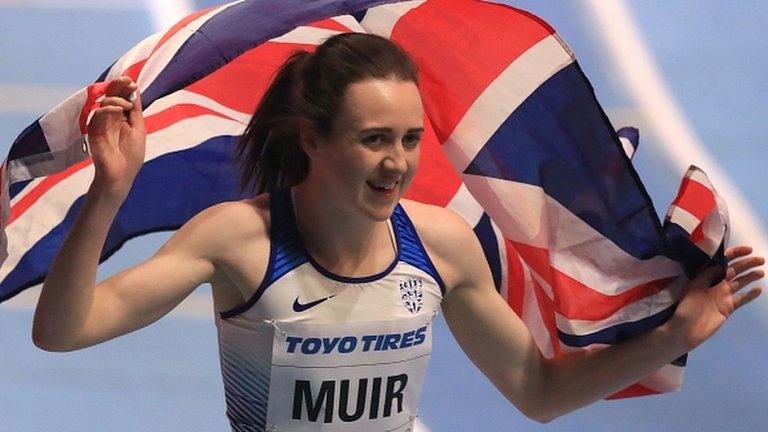
- Published21 April 2016
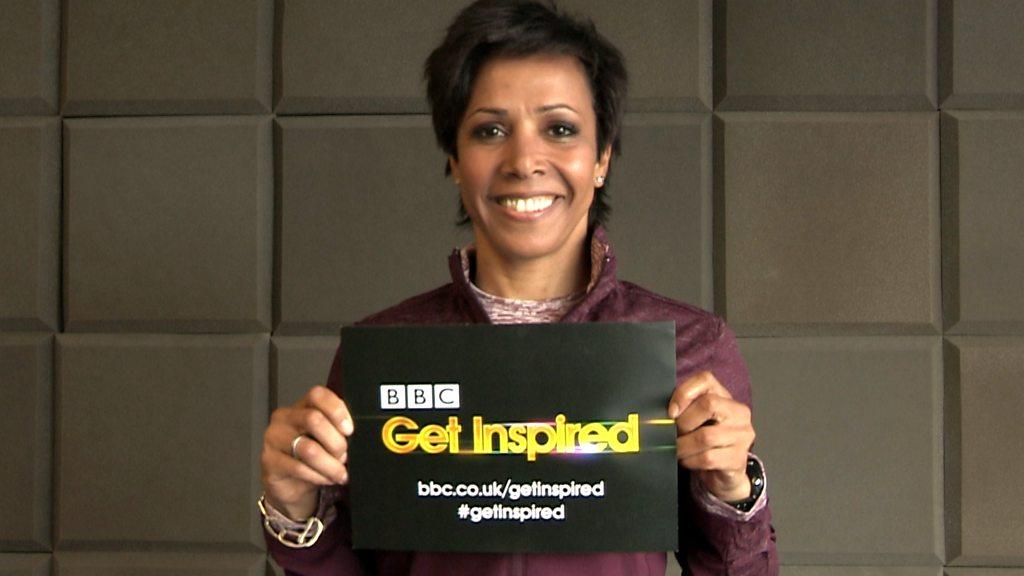
- Published8 April 2016
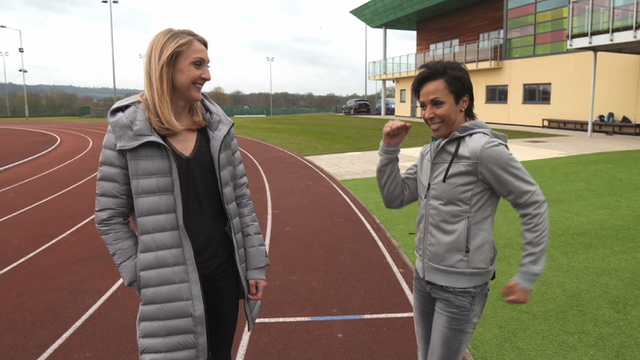
- Published3 April 2019
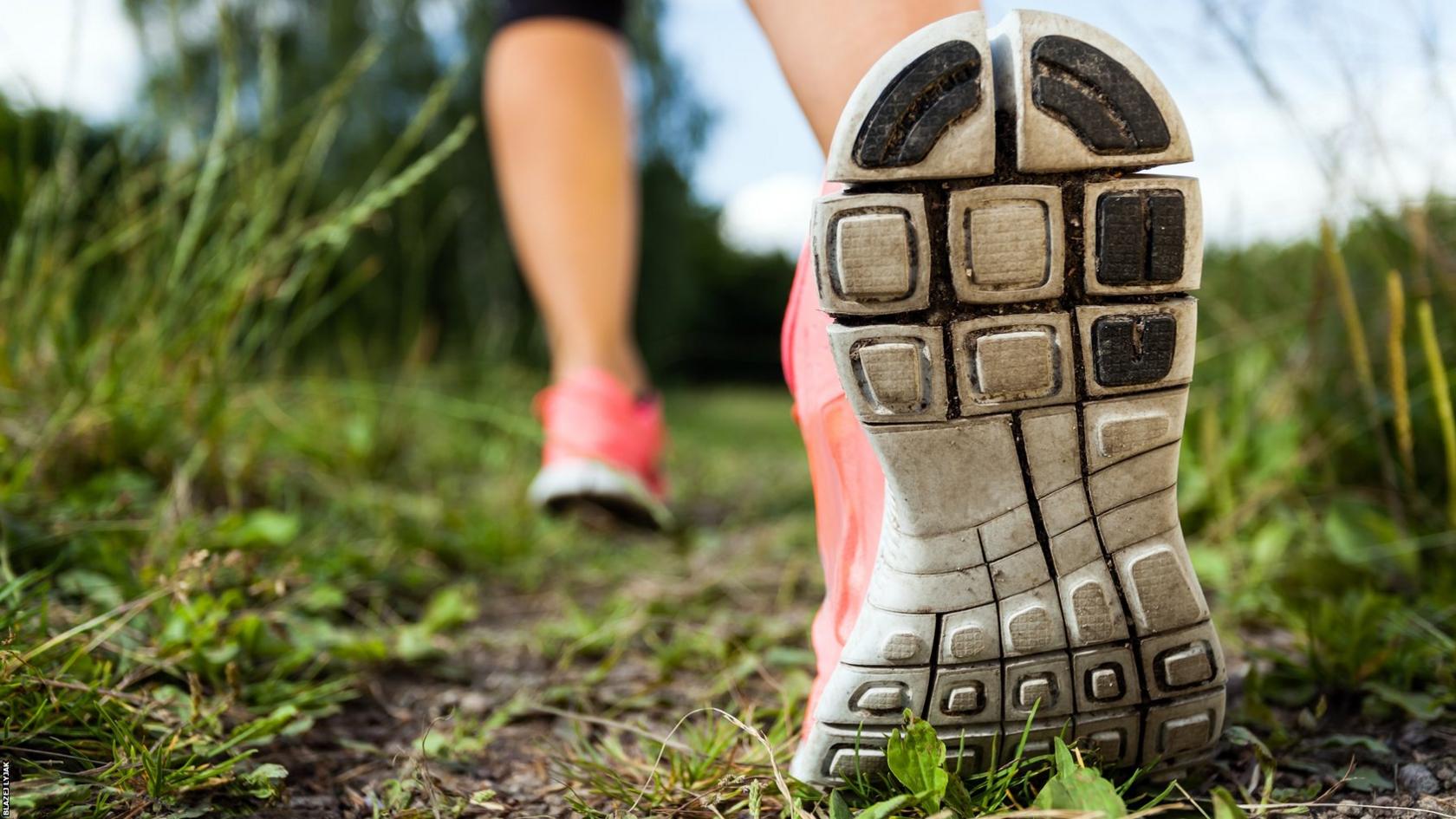
- Published22 April 2016
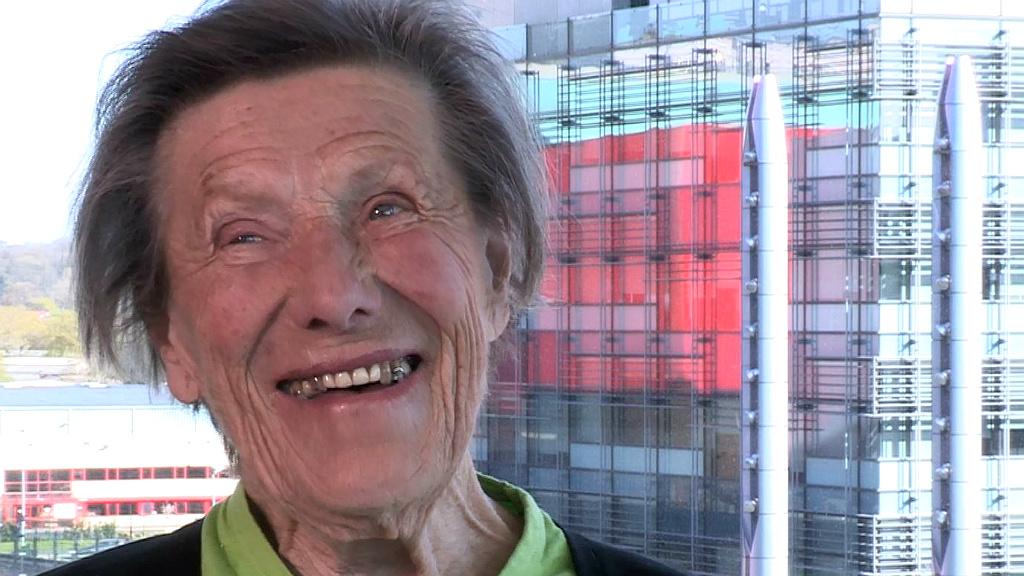
- Published21 April 2016
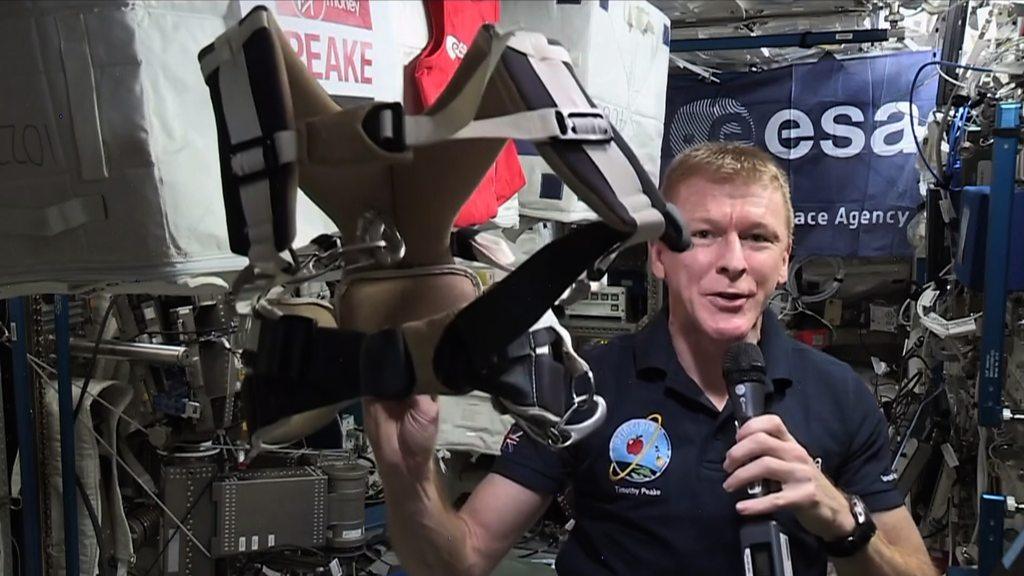
- Published22 April 2016
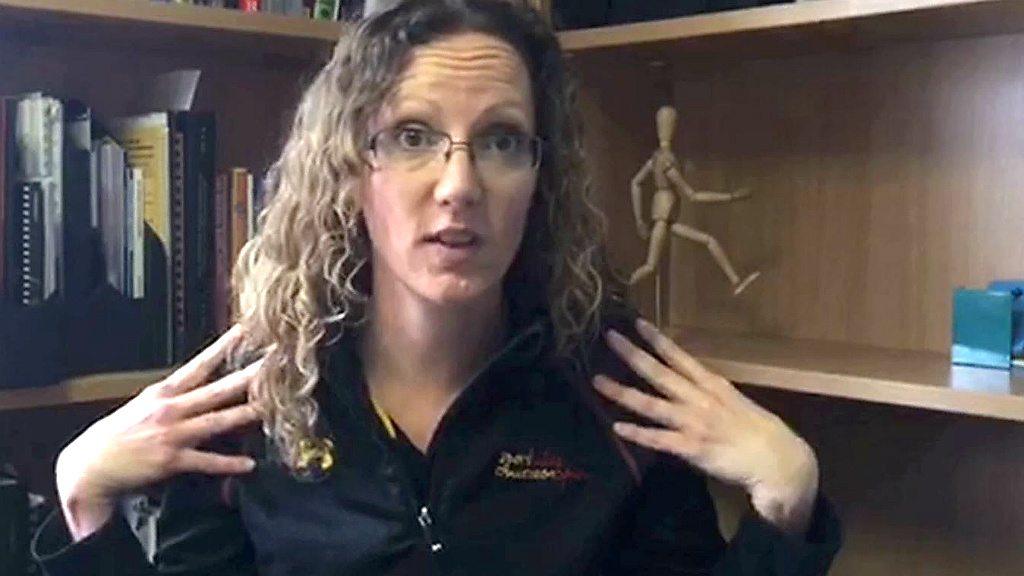
- Published21 April 2016
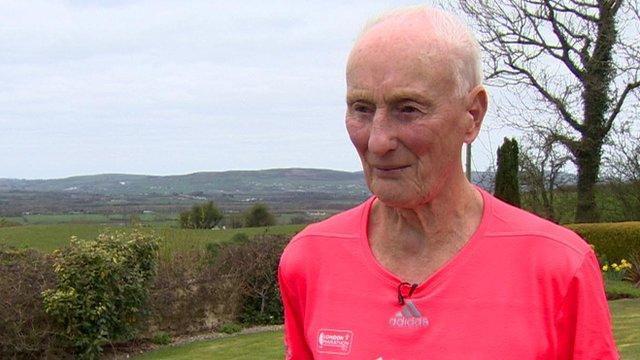
- Published11 April 2014
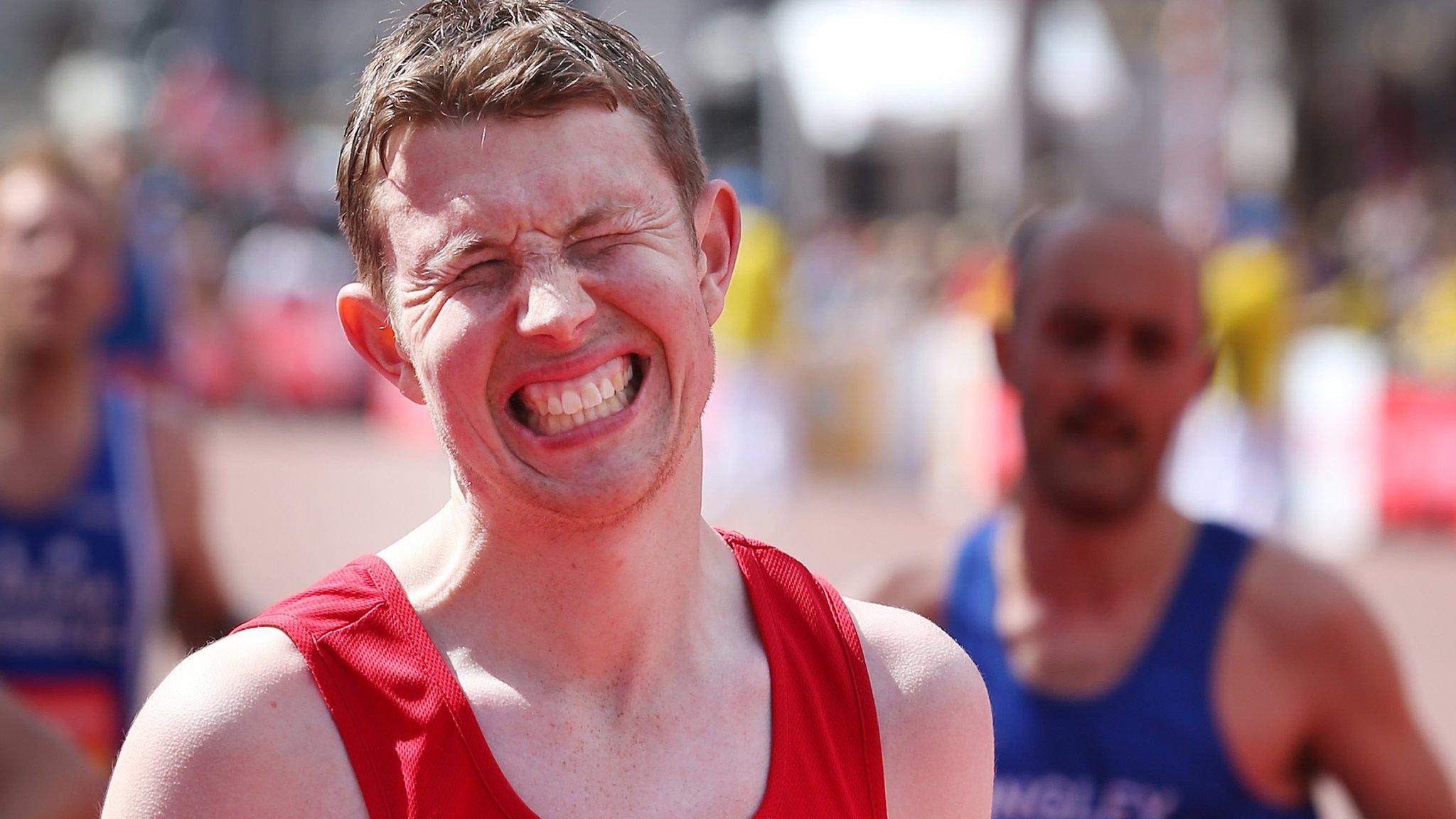
- Published2 October 2015
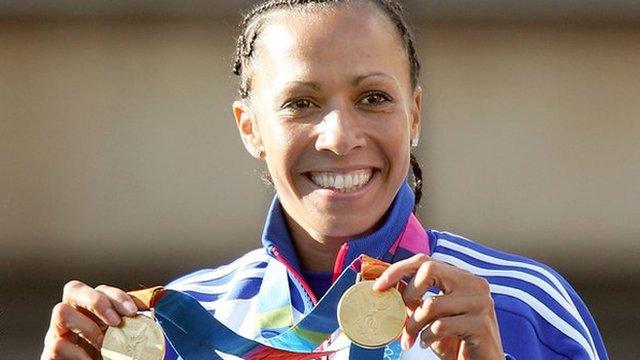
- Published8 February 2019
